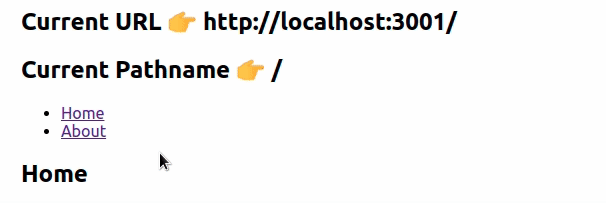在 React 中获取当前 URL 和路径名
Get the current URL and Pathname in React
在 React 中使用该window对象获取当前 URL,例如
window.location.href返回包含整个 URL 的字符串。如果您需要访问路径,请使用window.location.pathname. 该pathname属性返回一个字符串,其中包含该位置的 URL 路径。
应用程序.js
import React from 'react'; import {Route, Link, Routes, useLocation} from 'react-router-dom'; export default function App() { // 👇️ WITHOUT React router console.log('current URL 👉️', window.location.href); console.log('current Pathname 👉️', window.location.pathname); // 👇️ with React router const location = useLocation(); console.log('hash', location.hash); console.log('pathname', location.pathname); console.log('search', location.search); return ( <div> <div> <h2>Current URL 👉️ {window.location.href}</h2> <h2>Current Pathname 👉️ {window.location.pathname}</h2> <nav> <ul> <li> <Link to="/">Home</Link> </li> <li> <Link to="/about">About</Link> </li> </ul> </nav> <Routes> <Route path="/about" element={<About />} /> <Route path="/" element={<Home />} /> </Routes> </div> </div> ); } function Home() { return <h2>Home</h2>; } function About() { return <h2>About</h2>; }

我们可以在window.location
对象上获取完整的当前 URL 和路径名
。
应用程序.js
// 👇️ without React router console.log('current URL 👉️', window.location.href); console.log('current Pathname 👉️', window.location.pathname);

location.href
属性返回一个包含整个 URL 的字符串并允许更新
href。
location.pathname属性返回一个字符串,其中包含该
位置的 URL 路径,如果没有路径,则该字符串为空字符串。
如果你使用 React 路由器,你可以通过useLocation钩子访问当前位置对象
。
应用程序.js
import React from 'react'; import {Route, Link, Routes, useLocation} from 'react-router-dom'; export default function App() { // 👇️ with React router const location = useLocation(); console.log('hash', location.hash); console.log('pathname', location.pathname); console.log('search', location.search); return ( <div> <div> <h2>Current URL 👉️ {window.location.href}</h2> <h2>Current Pathname 👉️ {window.location.pathname}</h2> <nav> <ul> <li> <Link to="/">Home</Link> </li> <li> <Link to="/about">About</Link> </li> </ul> </nav> <Routes> <Route path="/about" element={<About />} /> <Route path="/" element={<Home />} /> </Routes> </div> </div> ); } function Home() { return <h2>Home</h2>; } function About() { return <h2>About</h2>; }
如果您使用这种方法,请确保将您的应用程序包装在文件中的Router
组件中index.js。
索引.js
import {createRoot} from 'react-dom/client'; import App from './App'; import {BrowserRouter as Router} from 'react-router-dom'; const rootElement = document.getElementById('root'); const root = createRoot(rootElement); // 👇️ wrap App in Router root.render( <Router> <App /> </Router> );
用
Router组件包装你的 React 应用程序的最佳位置是在你的index.js文件中,因为那是你的 React 应用程序的入口点。一旦你的整个应用程序都被一个组件包裹起来Router,你就可以在你的组件中的任何地方使用 react router 包中的任何钩子。
